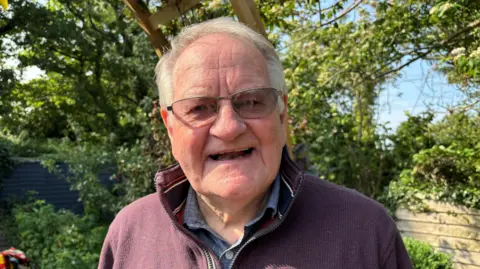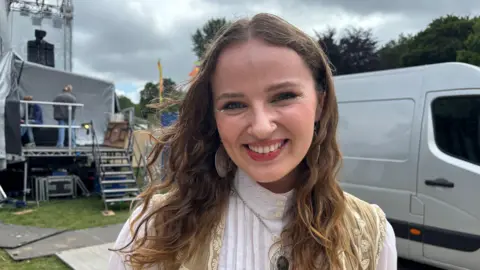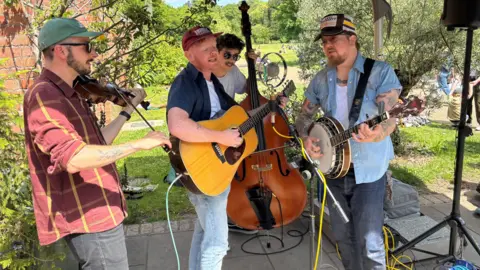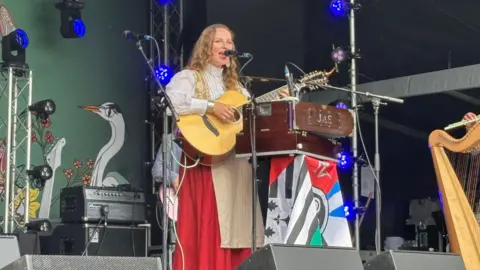Welsh folk music could die within a generation, report warns
 Getty Images
Getty ImagesWales' "fragile" folk music tradition could "die within a generation" without urgent action, a new report has said.
Research commissioned by Arts Council Wales found fewer young people were learning or growing up with traditional music skills.
Dafydd Iwan, who has brought Welsh folk music to millions through the success of his song Yma o Hyd, described the situation as "very worrying".
Arts Council Wales said folk music had not "been supported as it should have been", but it had now tripled its investment in the art form.
The review into the traditional music scene in Wales found traditional music sectors in England, Scotland and Ireland benefited from a "wide range of music industry support structures" that were "largely absent in Wales".
It noted that Scotland's traditional folk scene received 4.8% of its arts council's overall pot of money, compared with the Welsh folk scene which - at the time of the review - received 0.66%.
"People told us quite clearly, if we don't do something now, it's going to die within a generation," said the report author Angharad Wynne.
"There won't be any young people coming through the tradition. Things have been as serious as that."
She said the traditional way in which folk music was handed down from generation to generation had changed.
"Certainly there are some amazing people all over Wales who give their time free of charge... but increasingly the ecosystem has changed," she said.
"Everybody's got a second job because not many people can make a full-time living from being musicians."
She added: "That kind of handing down of traditional tunes and traditional style of playing just isn't happening anymore.
"And so what we saw was interventions are really needed, some funding is really needed, to shore up and enable some of those really great practices."

Iwan, whose 1983 song Yma o Hyd has been streamed more than three million times and has become a Wales football anthem, said the digital revolution had helped to take Welsh music "to all corners of the earth".
But he said young people did not usually stay in the industry beyond a few years because there was not enough support to help them build a career.
"At the moment, we're lagging well behind, and it's very worrying," he added.
"We must have government support to make sure that the young, especially the young people, have the backing to make the best of their talents and to make sure that their music is heard all over the world."
 BBC Wales
BBC WalesOne of Taylor Swift's best-selling and most critically acclaimed albums is her 2020 folk offering, Folklore.
Mari Mathias, a songwriter from Preseli in west Wales, said there was an appetite for folk music from young people, adding: "We need to give them what they want."
She said Welsh folk artists rarely took to big stages.
"There's a lot of bands that have started playing and performing in bigger shows, and traditional folk musicians... like Lankum and The Mary Wallopers [an Irish folk band]. They're performing on big stages like Glastonbury, and people really want to hear it."
Does she think the folk scene gets enough attention in Wales?
"I don't think so, no. If you look at Ireland, they've got so much support for young musicians, they've got schools and programmes with folk music. I don't think there's anything in Wales.
"We want community, we want to come together with folk music so there should be lots more support in my opinion."

David Grubb is a fiddle player with an emerging folk band from Cardiff called Taff Rapids.
They fuse traditional Welsh folk music with the faster pace of American bluegrass.
He said he initially struggled to find the folk scene when he moved to Wales' capital.
"It's taken many years for me to find people," he said.
He said it was evident Wales' folk scene had received less funding than Scotland, where he grew up.
"Having come from Scotland and growing up in that scene, it was much more obvious where that funding was going. There were folk groups, there was a folk course in the Royal College in Glasgow and whatnot," he said.
"The money that's been put into the folk scene is much more visible up there. When I came down to Cardiff, from the outside looking in at it, it didn't feel like there was much."

Dafydd Rhys, chief executive of Arts Council Wales, said the review's findings were "significant".
"I think it's true to say that in the past this art form hasn't been supported as it should have been," he said.
"But what I'm delighted to see now having considered the review's findings and having discussed it in the council, we are now actually almost trebling our investment as core funding, and on top of that there are additional opportunities for musicians and organisations to get more support as well.
"We've done the review, we've looked at the implications, we've considered it and - in a period where everybody is under financial strains - we've managed to come out and trebled the investment in this art form."
The Welsh government said supporting traditional music was one of its "ambitions".
"We note the Arts Council of Wales' response and will consider the report in its entirety," a spokesperson added.
